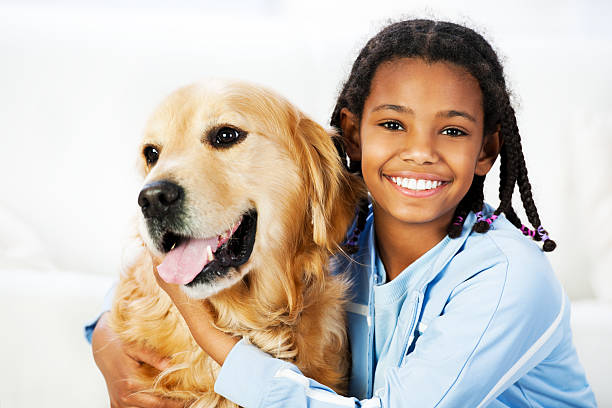For the child, the puppy represents a loyal friend, a playmate, and a source of endless joy. The innocence and exuberance of the puppy bring out the child’s playful nature, fostering an environment of laughter and delight.
In return, the puppy finds in the child a constant source of affection and care. The child becomes a provider of warmth, food, and shelter, creating a sense of security and belonging for the furry companion.
The shared experiences of playtime and exploration become cherished memories that shape the foundation of their relationship. Whether it’s a game of fetch, a walk in the park, or simply cuddling on the couch, these shared moments strengthen the bond between the child and the puppy.
Beyond the joyous play, the relationship teaches the child valuable life lessons. Responsibility takes center stage as the child learns to feed, groom, and care for the puppy’s well-being, instilling a sense of duty and accountability.
The emotional support provided by the puppy is immeasurable. In times of sadness or loneliness, the unconditional love of the furry friend becomes a comforting presence, offering solace and understanding without the need for words.
As the child takes on the role of caregiver, the puppy reciprocates with loyalty and trust. This reciprocal relationship helps the child develop empathy and compassion, understanding the needs and emotions of another living being.
The energetic nature of the puppy encourages physical activity, promoting a healthy and active lifestyle for both the child and the furry friend. Playful interactions, walks, and outdoor adventures become a shared routine that benefits their overall well-being.
The puppy becomes a silent confidant, providing a non-judgmental space for the child to express emotions and thoughts. This trust-filled relationship fosters a sense of security and openness for the child.
Learning patience is an inevitable part of the child-puppy dynamic. From training sessions to waiting for the puppy to grasp new commands, the child learns the art of patience and understanding, crucial skills that extend beyond the world of pets.
The selfless love and acceptance offered by the puppy contribute to building the child’s self-esteem and confidence. The unconditional regard from the furry companion creates a positive self-image for the child.
Through the puppy, the child learns about the importance of boundaries and respect for others. Understanding when the puppy needs space or recognizing cues for play helps the child develop a keen sense of empathy and consideration.
The shared experiences of caring for the puppy create a sense of teamwork within the family. Siblings or parents involved in the care routine teach the child the significance of collaboration and shared responsibilities.
The puppy’s non-verbal communication becomes a lesson in understanding body language and signals. The child learns to interpret the puppy’s needs and emotions, honing valuable communication skills that extend to interactions with others.
The presence of a puppy in the household can be a catalyst for social interactions. Whether it’s at the dog park, during walks, or playdates with friends, the child learns to navigate social situations and develop connections through the shared love for the puppy.
The unconditional love and loyalty of the puppy create a safe and secure environment for the child. This sense of security becomes a foundation for the child’s emotional well-being, contributing to a positive and nurturing atmosphere.
The bond between a child and a puppy often transcends the bounds of pet ownership; it becomes a lifelong friendship. As the child grows, the memories of their furry companion remain etched in their heart, shaping their understanding of love and connection.
The responsibility of caring for a living being instills a sense of empathy and understanding of the needs of others. These qualities, developed through the relationship with the puppy, become essential building blocks for the child’s emotional intelligence.
The shared routines and rituals, whether it’s the morning walk or bedtime cuddles, create a sense of stability and routine for both the child and the puppy. This routine becomes a comforting anchor in the sometimes-chaotic world of childhood.
The playful interactions and moments of joy contribute to the child’s overall happiness. The laughter and shared adventures create a positive and uplifting atmosphere that enhances the child’s emotional well-being.
In the end, the relationship between a child and a puppy is a reciprocal exchange of love, lessons, and shared experiences. It’s a connection that shapes the childhood of the human, while the puppy finds a devoted friend and caregiver in return, creating a bond that leaves a lasting impact on both their lives.
Share this post: on Twitter on Facebook on Google+

